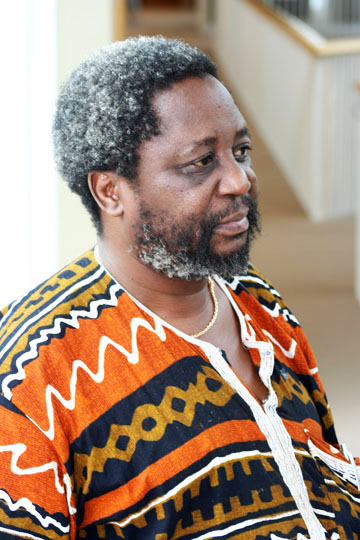Library Weekly
The ASCL's Library Weekly is our library’s weekly spotlight on African people and events. Inspired by the SciHiBlog, this service is based on information retrieved from Wikipedia and Wikidata and is completed with selected titles from the ASCL Library Catalogue.
N.B. The weeklies are not updated and reflect the state of information at a given point in time.
Library Weekly archive
Chenjerai Hove
 On 9 February 1956, Zimbabwean writer Chenjerai Hove was born in Mazvihwa, Zimbabwe. Widely considered a leading figure of Zimbabwean literature, he is the author of numerous works of poetry, prose, plays, children’s stories, and social criticism, much of it translated into German, Dutch, Swedish, Norwegian, and Japanese.
On 9 February 1956, Zimbabwean writer Chenjerai Hove was born in Mazvihwa, Zimbabwe. Widely considered a leading figure of Zimbabwean literature, he is the author of numerous works of poetry, prose, plays, children’s stories, and social criticism, much of it translated into German, Dutch, Swedish, Norwegian, and Japanese.
Hove attended school at Kutama College and Marist Brothers Dete, in the Hwange district of Zimbabwe. After studying in Gweru, he became a teacher and then took degrees at the University of South Africa and the University of Zimbabwe. He also worked as a journalist for the (Dutch newspaper) De Volkskrant and The Zimbabwean. Hove was president of the Zimbabwe Writers’ Union from 1984 to 1992, as well as an active human rights activist and founder of the Zimbabwe Human Rights Association (ZimRights).
Hove’s criticism of the Mugabe regime brought him into trouble with the Zimbabwean authorities. After intimidations and death threats, he left Zimbabwe in 2001, finding temporary refuge in France. In 2002 he stayed for several months in the Netherlands as part of a programme set up by ‘Poets of All Nations’ (PAN), an organisation that supports writers who find themselves in difficult situation in their home countries. Hove spent the rest of his life in exile.
Hove was honoured for his literary and journalistic work in several ways. In 1987 he received the Zimbabwe Writing Award, in 1989 the Noma Award for Publishing in Africa, and in 2001 the German-Afrika Award for his contributions to the freedom of expression as a newspaper columnist.
Chenjerai Hove died on 12 July 2015 at the age of 59 in Stavanger, Norway, where he had been living in exile for several years as part of the International Cities of Refuge Network .
(Source: Wikpedia & obituary African Studies Centre)
Selected publications
Writers, writing on conflicts and wars in Africa / Okey Ndibe; Chenjerai Hove. - London [etc.] : Adonis and Abbey [etc.], 2009
"Dictatorships are transient": Chenjerai Hove interviewed by Ranka Primorac.
In: Journal of Commonwealth literature, vol.43 , no. 1, p.135, 2008
Blind moon / Chenjerai Hove. - Harare : Weaver Press, 2003
Interview with Chenjerai Hove, by Taina Ternoven.
In: Africultures, 30 April 2003.
Palaver finish : essays / Chenjerai Hove. - Harare : Weaver Press, 2002
Bones / Chenjerai Hove. - Harare : Baobab Books, 1988
Ancestors / Chenjerai Hove. -London [etc.] : Picador, 1996
Berichten uit Harare / Chenjerai Hove; Peter Abpsoel. - Amsterdam : In de Knipscheer, 1993
Shadows / Chenjerai Hove. - Harare : Baobab Books, 1991
Podcast: Chenjerai Hove - Ancestors / BBC World Book Club. 05 February 2002 (25 min)
Timeline of Zimbabwean male writers via DBpedia and Wikidata

